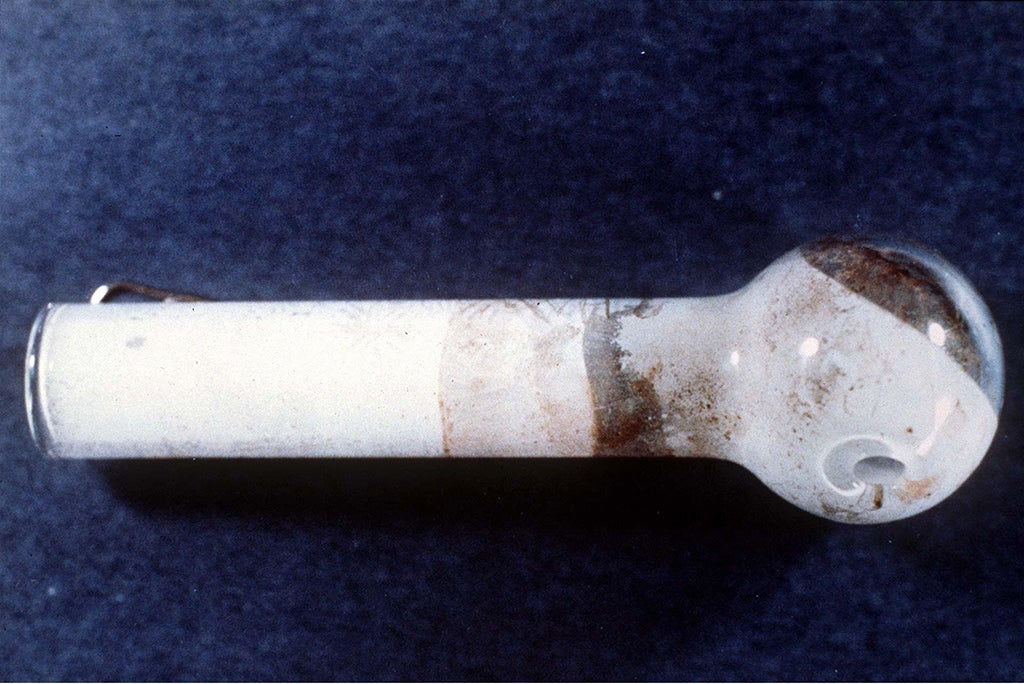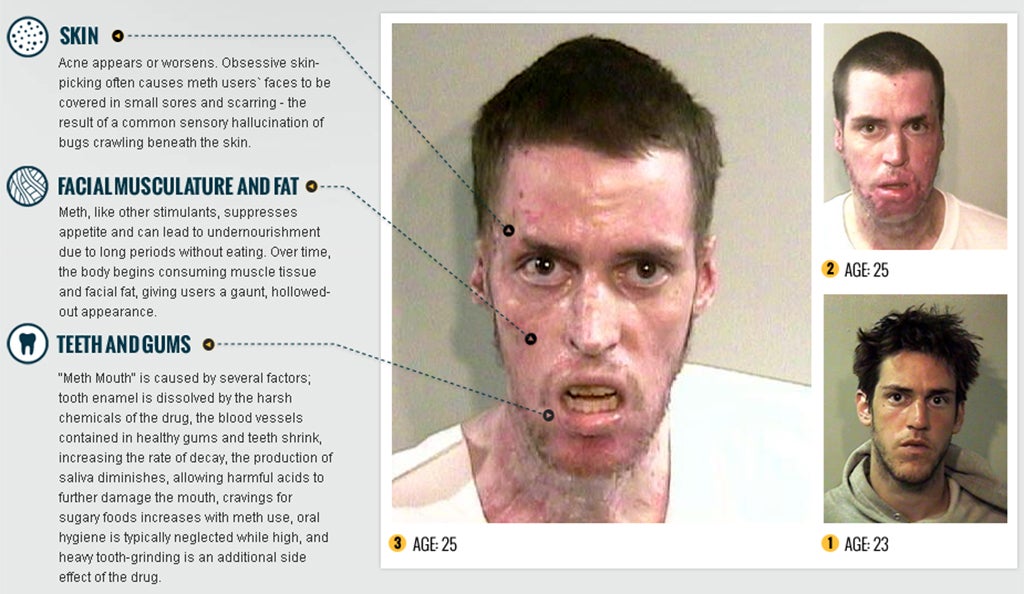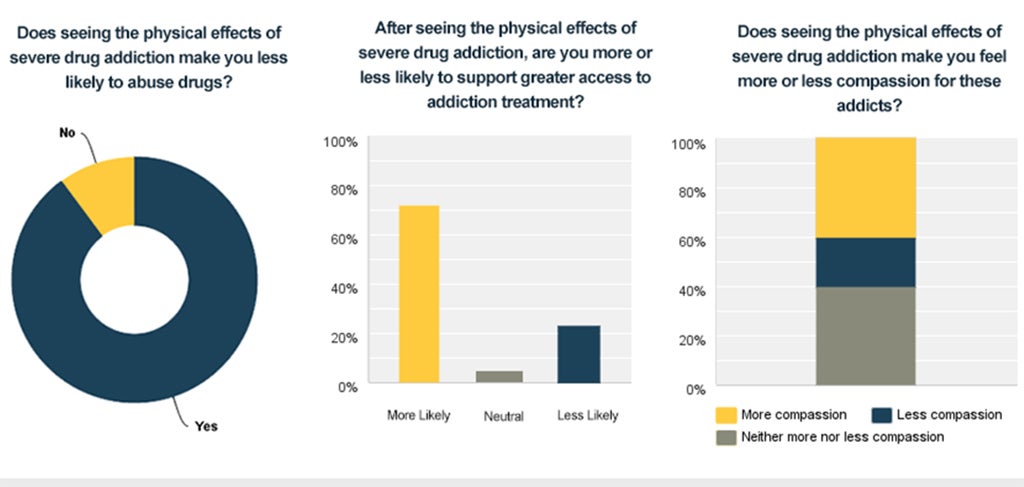How big a problem is crystal meth in the UK?
Has there been a rise in the use of crystal meth? Or are we more aware of the drug since Breaking Bad, as well as being exposed to images of its shocking physical effects on users?

The award-winning TV show Breaking Bad introduced many in the UK to the drug crystal meth, through the adventures of chemistry teacher Walter White and his accomplice Jesse Pinkman. The series highlighted the criminality and huge profits associated with crystal meth manufacture and distribution, and it continues to be a drug where many find the physical effects shocking. But as it comes to UK screens, how much of a problem is it in the UK, and has it got worse since the show first aired in 2008?
Crystal meth, or methamphetamine, as it is technically described, is a powerful psychoactive substance and one of a group of drugs known as ‘stimulants’ which include cocaine and amphetamine (speed). Methamphetamine is one of the most powerful stimulant drugs available on the illicit market and works by super-stimulating the reward pathways in the brain, primarily through increasing the levels of the neurotransmitter dopamine. Using the drug results in very powerful euphoric feelings, increased energy and heightened sexual appetite that can last for hours.
Methamphetamine has an interesting history having been first synthesized nearly one hundred years ago. It was marketed as a slimming pill for the treatment of obesity and later as a medication to treat attention deficit disorder. During the Second World War it was widely used by both sides of the conflict to keep troops alert for long periods. It was even recently rumoured that Hitler regularly used the drug, although this claim has been much disputed.
Japan was the first nation to experience widespread problems related to methamphetamine during the early 1950s, when some returning troops developed severe dependence on the drug and leading to it being banned.
We’re used to seeing visual comparisons of users before and after as a method to deter people from using the drug, as its physical effects can be visually shocking. A recent study suggested that the dramatic premature ageing seen in methamphetamine users may be due to changes in cell metabolism and drug-triggering inflammation.

Typically sold as a crystalline powder, methamphetamine is usually snorted, smoked or injected, often in binges lasting several days. Harms related to the drug are widespread including neurotoxic effects in the brain, damage to the lungs and teeth (meth mouth) as well as severe dependence. Further harms can result from injecting the drug including transmission of HIV and Hepatitis. Having a methamphetamine habit can result in a rapid decline in social functioning with users losing their jobs, families and health.
Methamphetamine has become popular in different parts of the world with Eastern Europe, South East Asia, South Africa, Australia and the United States experiencing significant levels of misuse and subsequent harm.
But what about the UK? A recent Home Office survey of drug use in England and Wales estimated that in the last year, just over two million people used cannabis, three quarters of a million people used cocaine, half a million people used ecstasy, whereas 25,000 used methamphetamine. In November 2014, Professor Ellis Cashmore from Staffordshire University said the global success of Breaking Bad could be to blame for the rise of methamphetamine use, but the levels of use appear to have changed little in the UK since they were first measured in 2008.
Looking at the number of people seeking treatment reveals much the same story with methamphetamine accounting for only 0.3% of all presentation to English drug services over the last year. In fact, only 240 people were recorded as asking for help with methamphetamine in the whole of England last year compared to nearly 8,000 people asking for help with cocaine related problems. Currently in the UK, methamphetamine appears to be used only by particular populations, most particularly some gay men, who use the drug to enhance sexual performance in what is generally termed “chemsex”. Outside of this group, there is little evidence that methamphetamine is gaining popularity, with UK drug users appearing to prefer other stimulant drugs, most notably, cocaine.
Given the small numbers, why does there remain such concern about a drug that is rarely used in the UK? Clinicians and policy makers are keeping an eye on methamphetamine because in other countries it is strongly associated with a range of health harms to both the individual and wider community as well as an association with crime. In a recent analysis of the relative harms of different psychoactive drugs, methamphetamine was ranked fourth out of all drugs, just behind alcohol, heroin and crack. There is particular concern about the rapid escalation to severe dependence and injecting seen in methamphetamine users.

In 2010, I founded the CNWL Club Drug Clinic to offer treatment to a new group of users taking club drugs and so called ‘legal highs’. This group seemed to be having difficulty engaging in traditional heroin-orientated treatment services and the clinic was designed to provide help tailored for clubbers. As well as club drug users, a surprising number of methamphetamine users have come forward for treatment, despite it not being a drug used for clubbing. This may be because methamphetamine users have found it difficult to access traditional heroin services. These users are experiencing high levels of methamphetamine-related problems including severe dependence and high risk behaviours including unprotected sex and injecting.
For now, methamphetamine remains a drug to watch. It is undoubtable one of the most harmful psychoactive drugs on the illicit market but at the moment, isn’t widely used in the UK. As a clinician who has seen the terrible cost that methamphetamine inflicts on the user, their family and wider community, I am hoping that it is one drug which remains limited to our television screens - and off our streets.
Dr Owen Bowden-Jones is a Consultant Psychiatrist and Lead Clinician for Club Drug Clinic Addictions Directorate, Central and North West London NHS Foundation Trust, and Clinical Adviser, Alcohol, Drugs and Tobacco Division, Public Health England
Join our commenting forum
Join thought-provoking conversations, follow other Independent readers and see their replies
Comments
Bookmark popover
Removed from bookmarks